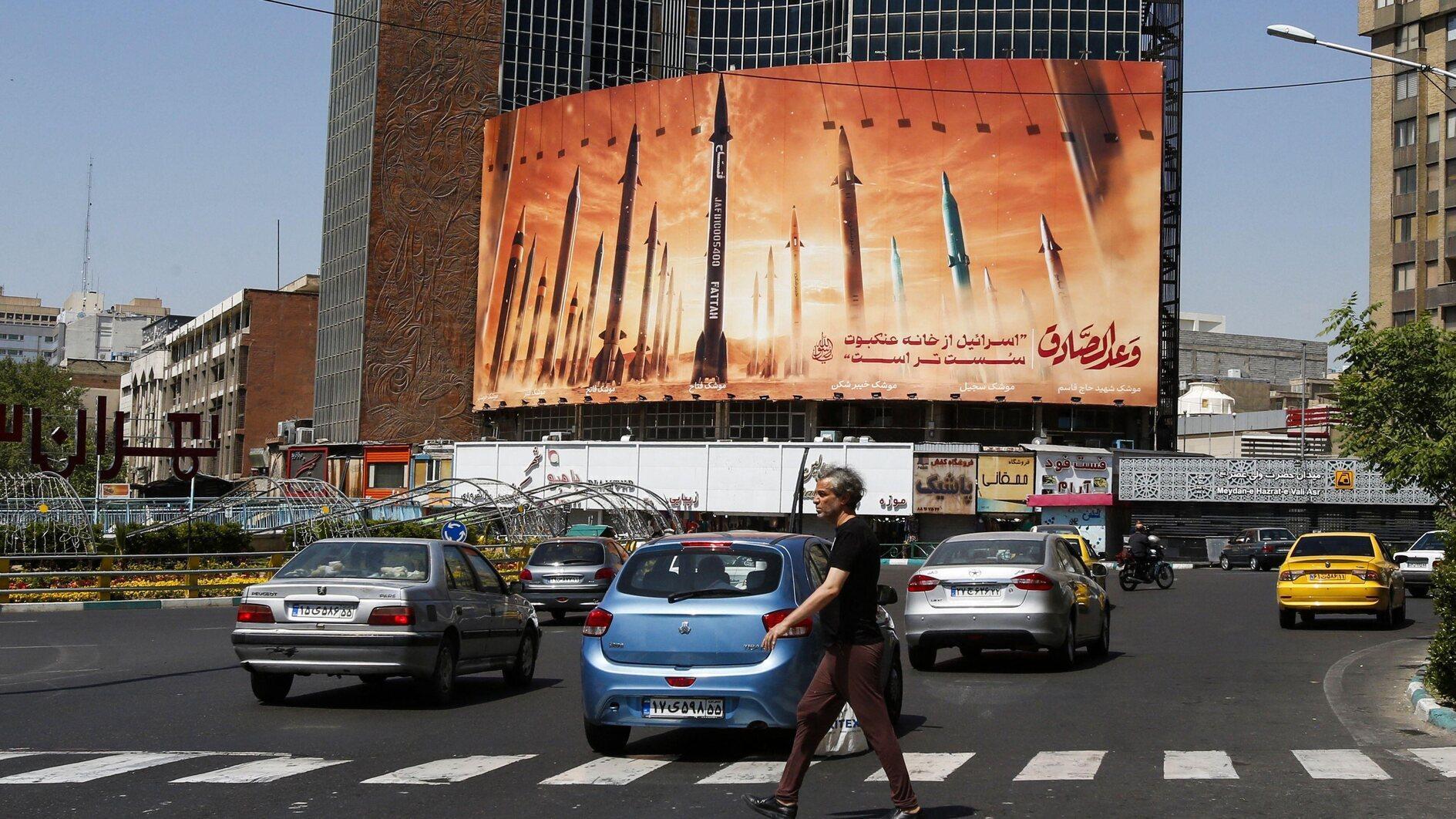Explosions in Iran, US media reports Israeli strikes
ISHAFAN

<p>A man crosses a street as motorists drive past a billboard depicting Iranian ballistic missiles in service in Tehran on April 19, 2024.</p>
Iran's state media reported explosions in the central province of Isfahan Friday, as U.S. media quoted officials saying Israel had carried out retaliatory strikes on its arch-rival.
Air defense systems over several Iranian cities were activated, state media reported, after the country's official broadcaster said explosions were heard near the city of Isfahan.
Israel had previously warned it would hit back after Iran fired hundreds of missiles and drones at Israel almost a week ago, in retaliation for a deadly strike — which Tehran blamed on its foe — that levelled Iran's consular annex at its embassy in Syria.
Fears of a major regional spillover from the Gaza war have since soared.
There had been no reaction from Israeli or Iranian officials to the overnight strikes and the extent of the damage remained unclear.
Iran's Tasnim news agency, citing "informed sources," denied that Iran had been attacked from abroad.
"Contrary to the rumours and claims" made in foreign media, "there are no reports of an attack from abroad on Iran's central city of Isfahan or any other part of the country," Tasnim said.
Three Iranian officials told The New York Times that small drones carried out the attack, possibly launched from inside Iran, and that its radar systems had not detected unidentified aircraft entering Iranian airspace.
Fars news agency reported "three explosions" heard close to Qahjavarestan, near Isfahan airport and the 8th Shekari army airbase, while Iran's space agency spokesman Hossein Dalirian said "several" drones had been "successfully shot down".
Dalirian said on social media platform X there were "no reports of a missile attack".
"Reports indicate there was no major damage or large explosions caused by the impact of any air threat," the official IRNA news agency said.
No nuclear site damage
The senior military officer in Isfahan, Brigadier General Siavash Mihandoost, told state television that the loud sound people heard was caused by defense systems shooting at a target in the air, not an explosion on the ground.
Nuclear facilities in Isfahan were reported to be "completely secure", Tasnim said, and the U.N.'s atomic watchdog reported "no damage" to Iran's nuclear sites.
Washington received advance notice of Israel's reported strike, but did not endorse the operation or play any part in its execution, U.S. media quoted officials as saying.
U.S. President Joe Biden had promised "ironclad" support for Israel but also urged it to "think carefully and strategically" before launching a response against Iran that could trigger a wider war.
NBC and CNN, citing sources familiar with the matter and a U.S. official, respectively, said Israel had pre-notified Washington of the strike.
CNN quoted one official as stating the target was not a nuclear facility.
There was no immediate comment from the White House or Pentagon, and the Israeli military told AFP: "We don't have a comment at this time."
Strikes in Syria
Overnight on April 13 Iran carried out its first attack directly targeting Israel, its regional foe.
Israel, backed by its allies, intercepted most of the 300 missiles and drones launched by Iran, and suffered no deaths.
Iran attacked in retaliation for the April 1 strike on its consulate in Damascus which killed seven of Iran's Revolutionary Guards, including two generals.
Iran-backed groups have bolstered President Bashar al-Assad's forces since the start of Syria's civil war in 2011.
Iran is also a key backer of the Palestinian militant group Hamas and Lebanon's Hezbollah.
Israeli Prime Minister Benjamin Netanyahu, who has vowed to destroy Hamas over its Oct. 7 attack that started the Gaza war, has stressed that Israel "reserves the right to protect itself" against Iran.
While it made clear it would not join a reprisal attack on Iran, Washington, Israel's main ally and military supplier, unveiled sanctions against people and entities involved in producing the drones deployed in the Iranian assault.
"We are holding Iran accountable," Biden said on Thursday, announcing the measures after the European Union said it would also sanction Iran's drone programme.
After its missile and drone barrage against Israel, Iran had declared the matter concluded. But Iranian Foreign Minister Hossein Amir-Abdollahian had warned Tehran would make Israel "regret" any new attack on the Islamic republic.
Mideast 'on a precipice'
Until its drone and missile attack, Iran and Israel had for years engaged in a shadow war, with Tehran accusing its adversary of a series of sabotage attacks and assassinations targeting its nuclear programme, carried out alongside the United States.
Israeli strikes also hit a military position in Syria's south, according to the Syrian Observatory for Human Rights war monitor.
The dawn strikes on Friday "targeted a radar installation of the Syrian army" between the provinces of Sweida and Daraa provinces, said Rami Abdel Rahman, who heads the Observatory.
On Thursday, U.N. Secretary-General Antonio Guterres painted a dark picture of the situation in the Middle East, warning that spiralling tensions over the war in Gaza and Iran's attack on Israel could devolve into a "full-scale regional conflict."
"The Middle East is on a precipice," Guterres told the Security Council.
"One miscalculation, one miscommunication, one mistake, could lead to the unthinkable", he said, calling on all parties to exercise "maximum restraint."
Oil prices surged more than three percent in early Asian trade on Friday following the reports of explosions, and Tokyo's Nikkei index suffered its largest drop in more than three years.
Citing reports that Israel had struck inside Iran, the United States embassy in Israel told its employees and families to limit their movements
















